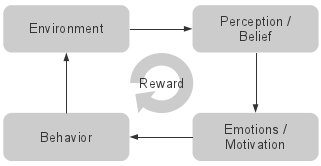People describe anger, depression, and many other emotions as negative or bad, as if they don’t want them in their lives. They’re useful! They motivate you to change what causes them, generally things in your environments and beliefs. What causes them is conflict between yourself and others, internal conflict, and wanting the world to change, mainly. As long as conflict exists, which is forever since no one shares your interests[…] Keep reading →
Insightful BBC video on mental models, beliefs, and how your mind perceives
on March 14, 2015 in Evolutionary Psychology, Models, Nature, PerceptionIf you like my perspective on being human and our place in the world, I recommend watching the videos of James Burke from BBC. They’re mostly available on YouTube. I first saw his series Connections and The Day The Universe Changed in the 80s on PBS. I watch them again periodically. His work is some of the few I find I like watching repeats as much as the original. I[…] Keep reading →
How different beliefs lead people with identical motivational systems to behave differently
on February 26, 2015 in Evolutionary Psychology, Models, Nature, PerceptionWe all have similar emotional systems, so why do we behave so differently? I illustrated below how people who have identical drives and emotional systems with only different beliefs can end up behaving differently yet feeling internally the same. I plan to represent it more graphically and pretty, but this is where I am so far. It shows that internally, we all think and react similarly. Only a slight difference[…] Keep reading →
I like judging people
on December 12, 2014 in Awareness, Evolutionary Psychology, Nature, NonjudgmentI write a lot about judgment and non-judgmental behavior. I won’t lie. I like to judge people. I decide whom I consider valuable or not, whom I think looks good or not, or has taste or social skills and so on. People seem mortified after doing the exercise in “The most effective self-awareness exercise I know of.” Seeing their thoughts written out on paper and realize how much they judge[…] Keep reading →
Why do you freak out when you’re late?
on October 9, 2014 in Awareness, Evolutionary Psychology, NatureYou’re stuck in traffic, late for an important meeting. There’s nothing you can do. Each tick of the clock reminds you of how bad this will make you look. If the meeting is important enough your palms sweat and your breathing becomes affected. Your mind keeps going around in circles about how to explain your lateness and making up excuses. Have you ever wondered why you react this way? You[…] Keep reading →
What makes an emotion a passion?
on September 20, 2014 in Evolutionary Psychology, Models, Nature, VisualizationWhat’s the difference between emotions and passions? In a leadership context I look at emotions functionally, as motivations. In an art or music context, I think more about how emotions feel and how to express them. To distinguish them, I think the functional view helps more. A passion is something that motivates you strongly with strong feelings. In other words, a passion is a strong or intense emotion. A lot[…] Keep reading →
What you’re thinking
on July 14, 2014 in Awareness, Evolutionary PsychologyThis post follows up “The most effective self-awareness exercise I know of” and the exercise in it, so I recommend reading it and doing it first. Besides making these posts personal, the exercise increases your self-awareness. When I talk to a client after doing that exercise, we cover six main points, which I’ll cover in detail below. The details of their results—that is, the content of their inner monologue and[…] Keep reading →
How to increase empathy, part 2: a model and strategy
on July 8, 2014 in Awareness, Evolutionary Psychology, Leadership, TipsYesterday’s post discussed how the world complicates understanding empathy with vague definitions and associating it with neediness and unwanted emotions. Today I’ll describe a simple model to understand empathy simply. A simple model for empathy The model you have for something determines how you understand it and how you use it. I’ll talk about emotions in general and then empathy in particular A simple model for emotions in general Many[…] Keep reading →
How to increase empathy, part 1: why it seems so hard to
on July 7, 2014 in Awareness, Evolutionary Psychology, Leadership, Tips, VisualizationYou want to improve your empathy because you’ve heard it’s fundamental to leadership, influence, and motivation, but find it hard to define, measure, or see in use, making it hard to improve or learn from others. In other words, empathy is important for working with people, but hard to learn, all the more so for those who lack it most. While I don’t pretend to be the most empathetic person,[…] Keep reading →


